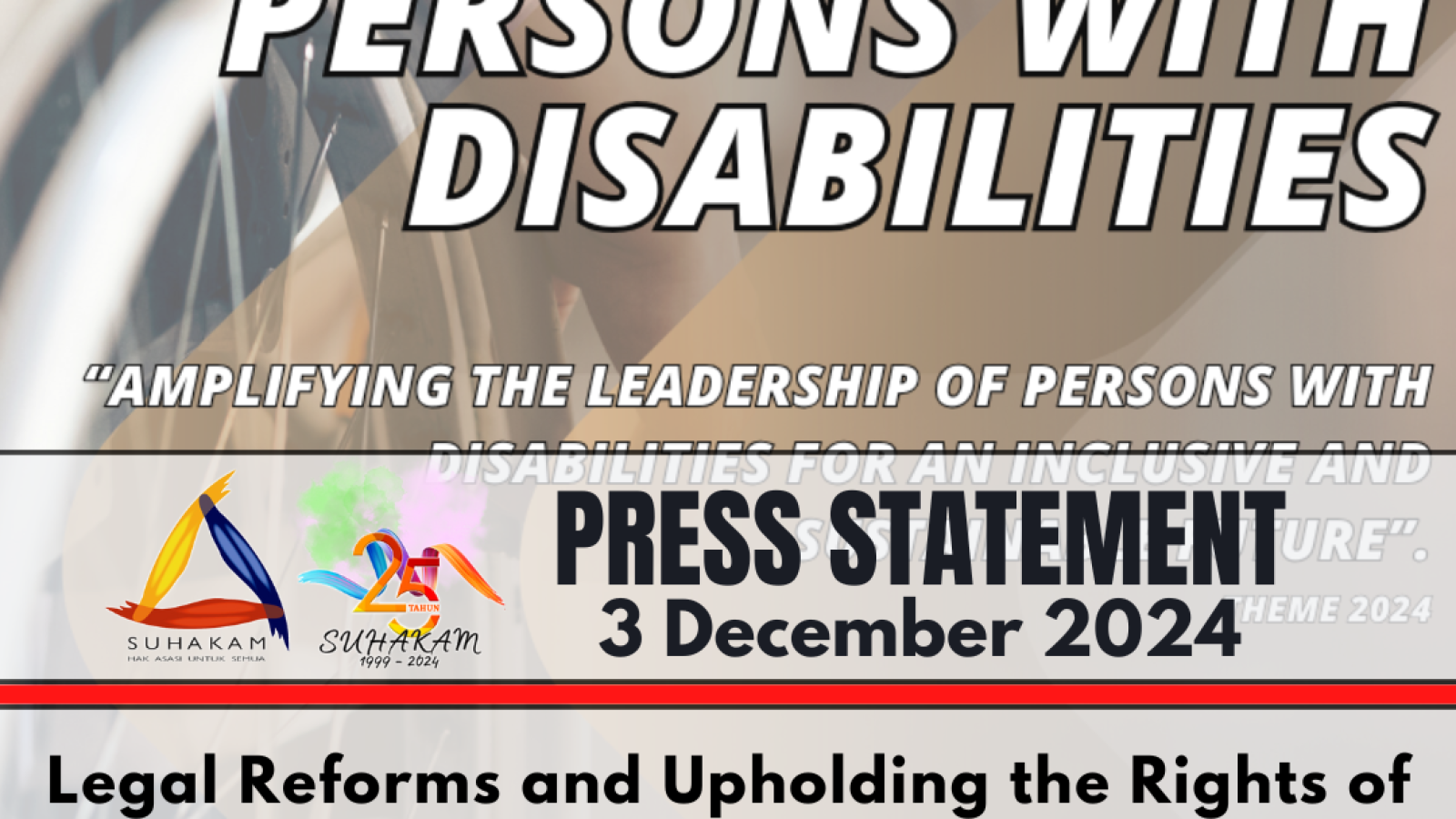KUALA LUMPUR (3 DECEMBER 2024) – The Human Rights Commission of Malaysia (SUHAKAM) commemorates the celebration of the International Day of Persons with Disabilities. In this commemoration, we stand in solidarity with persons with disabilities (PWDs) in Malaysia, and around the world.
The theme for this year, “Amplifying the leadership of persons with disabilities for an inclusive and sustainable future”, underscores the critical role PWDs play in shaping policies, communities, and a more inclusive future. It reminds us of the importance of amplifying the leadership of PWDs to achieve an inclusive and sustainable future. Leadership is not just about representation, it is also about empowering PWDs to actively engage in decision-making processes, ensuring that their voices are heard, and their rights are respected. We must recognize the efforts of numerous leaders within the disability community who have tirelessly advocated for inclusivity, accessibility, and equality, often in the face of significant challenges.
SUHAKAM commends the recent amendment to the SUHAKAM Act 1999, which mandates the inclusion of at least one Commissioner for PWDs in the decision-making process. To facilitate this commitment, SUHAKAM urges the swift appointment of the PWDs Commissioner to provide necessary support and action for individuals with disabilities. SUHAKAM reaffirms its commitment to safeguarding and promoting the rights of PWDs, advocating for stronger legislative frameworks, enhanced accessibility, and greater opportunities for PWDs to assume leadership roles across all sectors. By empowering PWDs’ leadership, we can truly create an inclusive society where every individual, regardless of ability, can thrive and contribute meaningfully.
Malaysia has been a state party to the Convention on the Rights of Persons with Disabilities (CRPD) for over 14 years. Malaysia signed the Convention on 8 April 2008 and ratified the same on 19 July 2010. In 2008 Parliament passed the Persons with Disabilities Act 2008 [Act 685] (PWDs Act).
It is high time now to incorporate the international Convention into the Federal Constitution. In this regard, SUHAKAM calls for amendments to Article 8(2) and Article 12 of the Federal Constitution to explicitly prohibit discrimination based on disabilities. SUHAKAM believes that significant work remains to address the challenges faced by persons with disabilities. PWDs need protection against torture and abuse, as well as recognition of their rights to nationality and movement. Therefore, it is crucial to lift the reservations to Articles 15 and 18 of the CRPD. SUHAKAM also urges the Government to expedite the submission of the National State Report on the CRPD.
SUHAKAM believes that significant work remains to address the challenges of persons with disabilities. PWDs are critically left out of access to education, health, information, and employment. Every PWD needs to be protected against fake, false and inappropriate information. There should be a platform to provide access to accurate and thorough information. Politicians, policymakers, PWDs and the community need to be further educated on PWDs’ rights.
SUHAKAM, therefore, urges the Government and all sectors of society to collaborate and take decisive actions to fully realize the rights of persons with disabilities in Malaysia. Among the measures to be taken is to advocate for amendments to the PWDs Act so as to provide for punishment or remedy for violations of the Act. Together, we can drive meaningful change. This is a crucial moment to embrace the motto “Nothing Without Us” as it highlights the importance of PWDs involvements and contributions.
SUHAKAM further advocates for the empowerment of the National Council for Persons with Disabilities. SUHAKAM takes this opportunity to stress that state governments must be earnest in their responsibility in ensuring accessibility for individuals with disabilities. SUHAKAM is actively conducting a survey to evaluate the accessibility services provided to persons with disabilities by local governments. We urge all local and state governments to take this survey seriously by expeditiously sharing their feedback to improve these essential services. Additionally, the Plan of Action for Persons with Disabilities 2016-2022 has exceeded its two-year timeline and is now positioned for a vital renewal that will strengthen our efforts for the future.
As we commemorate this important day, let us all unite to amplify the leadership of persons with disabilities and create an environment that supports their invaluable contributions. Together, we can build a future where dignity, respect, and equality are realities for all.
-END-
The Human Rights Commission of Malaysia (SUHAKAM)
Date: 3 December 2024











